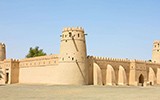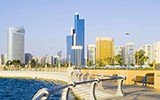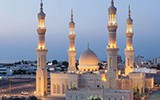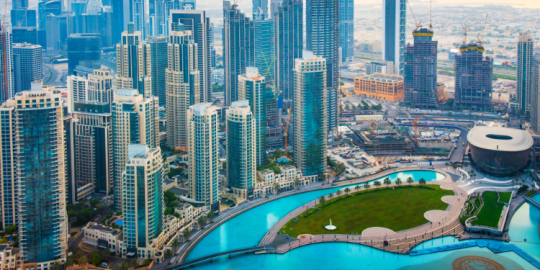The UAE has high-quality healthcare that is available to both locals and expats via hospitals, clinics and health care centres ...
Living in the United Arab Emirates guide for expats
All the information you need to relocate and live in the United Arab Emirates.
Our selection of articles for expatriation in the United Arab Emirates
Driving is the most popular way of getting around in the UAE — especially in big emirates like Dubai and Abu Dhabi. To ...
The expat population in the UAE makes up close to 90% -- and this means you will be living in a vibrant international community ...
If you decide to start a family in the UAE, you will probably be pleased to know that the country has a well-developed healthcare ...
The UAE is a generally safe country to travel to and live in. It has a very low crime rate and violent crime is rare. With that ...
If you are moving to the United Arab Emirates, you can rest assured that there are a lot of various leisure activities you can ...
If you are moving to the United Arab Emirates, you will need to find accommodation. There are a lot of expatriates relocating to ...
There are several advantages to starting a business in the United Arab Emirates. According to 'Doing Business 2020' (a ...
If you are not ready to make a long-term professional commitment to the UAE, an internship can be a great way to test the waters ...
Fujairah is one of the smaller emirates of the United Arab Emirates, located on the east coast. It is positioned as one of the ...
Located in the east of Abu Dhabi, Al Ain is the fourth biggest city in the United Arab Emirates. It is also known as the ...
Located in the northern region of the United Arab Emirates, Ras Al Khaimah is becoming a popular city with expatriates, due to ...
Located in the north of the United Arab Emirates, Ras al Khaimah is an emirate that has its own unique charm. Surrounded by ...
The United Arab Emirates is one of the most popular destinations in the world. Every year, it is visited by over 16 million ...
An eclectic mix of tradition and innovation, the UAE is a very interesting place to visit — and one of the most popular ...
About the United Arab Emirates
Demography of the UAE
According to the official statistics, the country has a population of about 9, 267, 000 inhabitants, out of which 7.8 million are expatriates. The United Arab Emirates is one of the world's most popular destinations for people around the world, especially Dubai, which has experienced an accelerated immigration rate over the past few years.
The economy of the UAE
The United Arab Emirates is the second-biggest economy in the Gulf, just after Saudi Arabia. Its income comes predominantly from the petroleum produced in both Abu Dhabi and Dubai. Today, the UAE is diversifying its economy to steer away from oil industry dependency. The country enjoys a robust tourism industry growth fueled by its world-class cities such as Abu Dhabi and Dubai.
The climate of the UAE
Due to its location, the UAE has a subtropical and dry climate, generally hot and sunny year-round. The hottest months are July and August with average maximum temperatures of over 50 ºC. In the mountains, it is slightly cooler due to the high altitude. Winters in the UAE are mild, with temperatures going down to a minimum of 15ºC and maximum temperatures of about 30 ºC. Rain is infrequent and does not last long, amounting to roughly five days of rainfall in a year. In early summer, strong winds blow from the north and north-west, causing sandstorms and bringing a lot of dust.
Government of the UAE
The country has a presidential system and a federal constitutional system since 1971. This includes a cabinet, a parliamentary body, a federal national council, and an independent judiciary system. Each emirate has its own governmental institutions, thus maintaining a large degree of independence.
The UAE is not strictly under the Islamic Sharia law but uses a few elements derived from it. The Sharia law is only used in specific circumstances, for instance, when solving family matters such as divorce, or succession. Furthermore, the UAE has replaced some of the punishment terms of the Sharia, such as being sent to jail as opposed to being flogged for an offence.
Immigration in the UAE
Several types of visas are available for those who want to live or visit Abu Dhabi. These are the types: Business visa, tourist visa, transit visa, student visa, retirement visa, eVisa for GCC residents and patient and his/her companion’s entry permits.
Business visa – A type of visa that entrepreneurs can apply for in order to stay for a long period in the country. Their dependents are also eligible as long as the entrepreneur has set up a business in the country.
Tourist visa – A tourist visa is one of the most common types. This can be used for 30 days or 90 days, with single and multiple entries options. The visa is extendable for up to two times without a need to exit the country.
Student visa – A student visa qualifies an individual to study in the UAE. An individual should be over 18 years and residing in the UAE. Exceptions are available for outstanding students who can get a long-term one for 5 years.
Transit visa – The type of visa is popular among those who have layovers in Dubai or Abu Dhabi. There are two types: 48-hour visa, which is free of charge, and the 96-hour visa for 50 AED only. The transit visa is sponsored by the passenger’s airlines and must be obtained and approved prior to flying into the country. These are non-extendable.
Retirement visa – A visa type that residents over 55 years of age can acquire for a period of 5 years. It can be renewed if eligibility criteria are met.
Patient entry permit – Foreigners can enter the country with their companions for treatment in the UAE. The sponsor is the medical establishment (public and private), and there are two types: 1. Single Entry Permit for Treatment, and 2. Multiple Entry Permit for Treatment.
Culture in the UAE
The UAE is predominantly Sunni Muslims, and its culture is rooted in Arabic Islamic traditions. The country is a melting pot of different cultures brought in by expats from all over the world, which is why it also has strong international influences while the traditional Islamic is still interwoven. There is a mix of old and new, which makes for a very refreshing and worldly perspective on tolerance and hospitality.
Language in the UAE
Arabic is the most dominant language spoken in the UAE, but English, Malayalam, Hindi, Tamil, Tulu, Amharic, Somali, Bengali and Tigrinya are also widely spoken by foreign workers.
Social life in the UAE
Social life in the UAE is thriving. No matter what your interests are, there is always something for everyone. There are social groups for sports, culture and poetry, cultural communities for people of the same ethnic groups and social groups for various causes as well.
Useful links:















